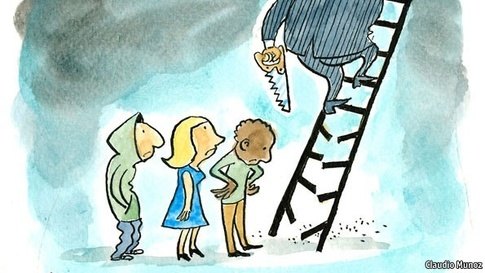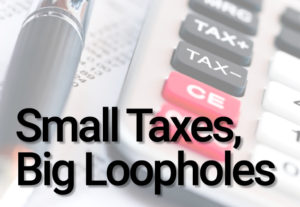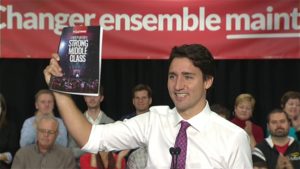 Ray Rivers
Ray Rivers
September 15, 2017
BURLINGTON, ON
One only pays income taxes if one has some kind of income. The more income one has, the more taxes he/she can afford to pay. Canadians agreed a long time ago that it is only fair that the wealthy pay a greater share of the tax burden, commensurate with their greater income. So our income taxes are progressive, meaning that the percentage of income being taxed rises with earnings.

Tax ladder
Over the last several decades however, it has all gone awry. The richest one and/or ten percent of us continue to grow their share of the economic pie at the expense of the rest of us. And the spread between the upper and lower classes continues to grow wider while governments cut income tax rates and rely more on sales taxes (HST) for their revenues. Sales taxes are regressive in that they hurt the lower income folks more than the wealthiest.

Robin Hood – Not a model any government wanted to use.
Income taxation is not only the fairest from the perspective of equity, but also the most efficient in terms of economic growth. According to the early British economist Sir Robin Hood stealing from the rich to give to the poor favours economic growth simply because the poor spend more of the money they have than do the rich. Of course Sir Robin’s theory flies in the face of now disparaged right-wing gospel song titled ‘trickle-down-economics’, in which giving more money to the rich was supposed to eventually trickle down over the tops of their boots to the poorer people down below.
Mr Trudeau came to office with a promise to restore the middle class in this country and he knows appropriate taxation lies at the heart of that promise. So in his first budget he made the tax system more progressive by adding more tax classes and marginally increasing the rate the biggest income earners have to pay, while even more marginally reducing the ones at the lower end.
He also campaigned to reduce unfairness in the tax system by closing loopholes. So the other day his finance minister Mr. Morneau announced they were going to curb the way in which small incorporated business owners have been avoiding taxation by misrepresenting the costs of doing business – sprinkling payments to family members who don’t actually work in the business.
Of course everyone of us believes in getting rid of tax loop holes and believes in tax fairness. That is, until our own ox gets gored, the hens come home to roost, or whatever it is we say on the farm. So small business people, and most notably doctors are screaming blue murder that they’ll have to pay more taxes if this loophole is eliminated. And they have their rationale, indeed as we all do. But unless you are a doctor you can’t possibly understand how hard it is to get by on what doctors make, even the ones who opt to be paid a salary.
 The truth is that our tax system is a mess, a morass of loopholes and tax exemptions which have crept up on us like cobwebs in an untidy garage. Successive governments kept gluing on these addenda, primarily doing their best to serve the needs of the country, and too often and sadly, serving the needs or their electoral base in spite of the country.
The truth is that our tax system is a mess, a morass of loopholes and tax exemptions which have crept up on us like cobwebs in an untidy garage. Successive governments kept gluing on these addenda, primarily doing their best to serve the needs of the country, and too often and sadly, serving the needs or their electoral base in spite of the country.
Like everything governmental there is a political perspective to the tax system. So we retain popular personal deductions when that function could mostly be replaced simply by raising the minimum level at which people have to start paying taxes. If the politicians would agree to making our Canada Pension Plan a genuine livable pension, RRSP’s and private pension plan contributions could be eliminated as deductions. And of course broadening our health insurance system and adding dental coverage to our social programs would eliminate those health deductions from needing to appear on the tax form.
A dollar of income is a dollar of income, right? So why not treat all sources: employment earnings, net business income, bank/investment interest, dividends and capital gains the same? And why don’t we tax the other incomes, from windfalls such as lotteries, gambling and inheritance? Interestingly a professional gambler does need to pay taxes on his/her winnings, though he/she can also claim eligible business deductions.
 Aside from the loopholes and the degree of progressivity, there is the whole tax filing process. Once upon a time we could get by by mailing in a measly four sheets of paper and a couple T-4s. Today’s return requires reams of annexes and tables up the wazoo. There are now literally dozens of private sector computer-based and on-line packages and they are all just different enough to make them proprietary, though they all claim to be accurate.
Aside from the loopholes and the degree of progressivity, there is the whole tax filing process. Once upon a time we could get by by mailing in a measly four sheets of paper and a couple T-4s. Today’s return requires reams of annexes and tables up the wazoo. There are now literally dozens of private sector computer-based and on-line packages and they are all just different enough to make them proprietary, though they all claim to be accurate.
In fact the government has stopped mailing out tax filing packages so one practically has to buy a package anyway, or hire a tax accountant. Complexity had made the long tax form obsolete. Nobody can file that way unless they have at their disposal a computer, calculator, abacus and rabbit’’s foot, perhaps not in that order.
So it is hard to argue against Mr. Trudeau taking on the long overdue and thankless job of reforming a system which was last re-invented in the late 1980’s when Brian Mulroney sought to give us a taste of his notion of tax simplification. However, the approach Mr. Trudeau is taking is piecemeal at best, a sort of facelift when what is really required is major surgery.
 Might one speculate that the Liberals are hoping the changes they are making, like decorating a house room at a time, will be harder for any subsequent Conservative government to dismantle and discard? Or perhaps the task of tearing down and reconstructing the entire building at one time is just too daunting for a government nearing the middle point in its term in office. In which case we can only hope that there is a master blueprint for the design of a better castle or implement shed.
Might one speculate that the Liberals are hoping the changes they are making, like decorating a house room at a time, will be harder for any subsequent Conservative government to dismantle and discard? Or perhaps the task of tearing down and reconstructing the entire building at one time is just too daunting for a government nearing the middle point in its term in office. In which case we can only hope that there is a master blueprint for the design of a better castle or implement shed.
 Ray Rivers writes weekly on both federal and provincial politics, applying his more than 25 years as a federal bureaucrat to his thinking. Rivers was a candidate for provincial office in Burlington in 1995. He was the founder of the Burlington citizen committee on sustainability at a time when climate warming was a hotly debated subject. Tweet @rayzrivers
Ray Rivers writes weekly on both federal and provincial politics, applying his more than 25 years as a federal bureaucrat to his thinking. Rivers was a candidate for provincial office in Burlington in 1995. He was the founder of the Burlington citizen committee on sustainability at a time when climate warming was a hotly debated subject. Tweet @rayzrivers
Background links:
Tax Fairness – Morneau’s Changes – Tax Reform –
Taxes and Growth – Tax Consultations – Capital Gains Taxation –















” Prime Minister, Justin Trudeau earns $340,000 annually and lives for free in a house on the grounds of Rideau Hall, as well as having access to a private government-owned lakeside cottage in the Gatineau Hills.
….
“The Prime Minister is also a joint owner with his brother, Alexandre, of 9190-0563 Quebec Inc. The corporate profile says its activities in the Laurentian countryside include real estate development and the production and sale of timber and firewood. Its most recent evaluation for property tax (2017-19) was $2.73-million.”
Source G&M
You are a strange person, Mr. Rivers. You say that you personally would have preferred to choose managing your own investments rather than have the employer you work for manage them for you. But then you are endorsing a proposal that would effectively eliminate personal choice. If the CPP became the be-all and end-all you think it should be there would be no purpose to private pension plans and RRSP strategies, so eliminating the tax deductions for these would simply be redundant. I think you spent too many years in the civil service where people are trained to think that ‘one-size fits all’. Putting all your eggs in one basket, which is in essence what you are suggesting, is always a dangerous investment strategy, especially when the government holds the basket.
Some of us are not as complacent about the wisdom of government to know what is best for us, as you seem to be.
Ray,
It seems that the Federal gov’t does have a magical wand and they are going to wave it at the ‘Small business Corporations’.
What they will not do is wave their magic wand at their voting base (in this case the civil servants) as it would send the liberals back to a two-seat party. Wynne does the same voting bribery here by giving the perks to her voting base (teachers).
You still have not addressed why Minster of Finance Morneau and his CEO buddies did not have their ‘Stock Options’ taxed significantly as the Liberal party said they would in their campaign?
Am I the only one that’s going to ask the obvious question. If changing the tax code is about fairness, why not DECREASE taxes for those unaffected rather than INCREASE taxes on small business? That would make things ‘fair’. I bet that option was never even considered by the Trust Fund Club.
Mr d. duck, thanks for the article – a good read indeed with some valid points though it ignores some basics.
For one thing benefit packages are part of an employment contract. So a person accepting work as a teacher, for example, reasonably expects that the pension plan they signed up to will continue unless it is re-negotiated. And that is the second thing for government and many large industrial and institutional retirement packages – their terms were the result of negotiation and often a trade-off with higher salaries and wages. So it’s often not as easy as one party to a contract waving a wand and changing the nature of the pension plan.
Note that the Canada Pension Plan is a defined benefit plan and as with the ones identified in the article is based the number of years of employment at some average percent of the previous five or seven years salary level – not how well the markets are performing. So there is precedent and rationale for defined benefit pension plans. That contrasts with a ‘defined contribution plan’ which is essentially an employer managed investment fund – and something the author refers to as a ‘targeted pension plan’.
Given a choice I’d opt for a RRSP over a defined contribution pension plan. I’d prefer to make my own investment decisions rather than let an employer use my money and hope they can achieve a rate of return better than I could in the markets.
But the author is right that government pensions and indeed all private pension plans need review. There would be a strong argument to replaced them all, if we had an enhanced Canada Pension Plan set a level playing field for all employees in our society. This, by the way, was where the now discontinued Ontario plan was heading – to provide coverage for working people who didn’t have a workplace plan. Those wanting more retirement savings could always top-up with personal savings.
With a significantly improved CPP one could propose to eliminate the tax deductibility of all private pension plans, including the public service plan, and other retirement add-ons like RRSP’s. In fact one might be able to also consider the elimination of OAS for those covered under an enhanced CPP. Food for thought…..
Thanks for the question and the discussion.
Ray,
Can you tell me why this will never happen………being rhetorical. Here is tax revenue generating that will compete with Trudeau’s spending spree.
https://beta.theglobeandmail.com/report-on-business/rob-commentary/if-proposed-tax-rules-are-about-fairness-federal-civil-servants-should-be-next/article36287503/?ref=https://www.theglobeandmail.com&
Everyone is allowed their opinion. An opinion is just that, putting it onto paper does not make it anymore correct. Furthermore, a minority of people do not supersede the majority in this social democracy even though the squeaky wheel usually gets the grease……….why, because the majority do not speak up.
“We need adequate tax revenues to fund social programs such as affordable housing, pharmacare, social assistance, legal aid, and the health-care system itself,” the letter states. “These programs directly impact the health of our patients, and we believe it is important for us to contribute to their sustainability through an adequate tax base.”
If I believed that giving more tax money would lead to the above then I am all for it. I pay my fair share and would pay more it I trust politicians to use our tax money in a fiscally responsible manner, i.e., Healthcare for years has been held stagnant with worsening healthcare issues as per the CIHI, OECD and recent wait time surveys. No matter what the politicians say, good data trumps (that’s rich) verbal political rhetoric every time.
Four hoofs good but two hoofs better is what I see from our political elite.
Thanks for your comments – there is an article in the Huff Post about the other doctors who agree with closing loopholes to make the system fairer. They have started a position of support for the tax changes and are disgusted and embarrassed with their colleagues.
https://www.huffingtonpost.ca/2017/09/17/doctors-who-support-tax-changes-want-their-voices-to-be-heard_a_23212489/?utm_hp_ref=ca-homepage
If I get rich selling a product people need, and I’ve produced, how is that at the expense of other people?
Stephen – thanks for your thoughtful response. Change is not always easy. I’ve run a small business so am familiar with the loopholes the PM would like to close. And as you point out one person’s loophole is another’s security blanket. But then wouldn’t it be better for a subsidy to be explicit, rather than buried in the tax code as a sidebar or worse, if we need to find a way to assist small business in becoming sustainable.
Ray
I don’t mind paying taxes BUT I do mind that ALL levels of gov’t are wasting inordinate sums of our tax money on fiscally irresponsible and mismanaged gov’t initiatives….. Burlington Pier, Burlington Go station, Ontario Gas scandal, Ontario computer scandal, Ontario Green Energy, Ontario corporations/LHINs CEOs income, Toronto’s computer scandal, Toronto school board, Toronto’s 65K park stairs built for $500 dollars, Liberal Federal gov’t 10billion dollar deficit now at 50Billion and reaching for the stars, etc, etc, etc??
If I ran my business the way Gov’t run theirs, I would be bankrupt but the Gov’t just reaches into our pockets without even a thank you. Mismanagement, arrogance, stupidity and poor business deals are the only reasons why our taxes continue to expand like Mike Duffy’s waist & the civil-servant bureaucrats with their fat benefit and pension packages.
Why can’t we hold all levels of Gov’t responsible and demand transparency & accountability??
Why didn’t Trudeau keep his promise about the 0.1%ers ‘Stock Option’ loopholes like he promised in his campaign. Maybe because Morneau, who vetted a large number of stock options before the election, and his CEO buddies’ gave PM JT a wink-&-a-nod.
Look up what JT’s buddy Gerald Butts role was in this current fiasco. Policy advisor to Liberal Premier McGuinty and Minister of Health Smitherman in 2005 who negotiated Physician settlement (no fee increase but incorporation options for retirement, maternity leave, etc) and now JT’s BFF in Ottawa as the PMO Secretary. The same guy who tried to swindle the tax payers for his move to Ottawa. When you help to balance the budget of the largest province at the expense of future Federal tax coffers, something has got to bust.
By the way, income/revenue is NOT the same thing as a salary.
It’s a pity Ray that you didn’t attend Karina Gould’s Town Hall meeting last Saturday. Had you been there you would have seen upwards of a hundred frustrated, angry, bitter and impassioned small business owners speaking about the sordid mess that the Prime Minister and his Finance Minister have unleashed on small business professionals in the name of “equity” and “fairness”.
I’m not an accountant, or a lawyer, and I am not affected by these changes. Nevertheless, this is what I heard: 1) family farms being threatened; 2) medical professionals who are already saddled with huge student loans and business debts who are considering leaving Canada because their income will be severely impacted; 3) tax levels in excess of 70% for business owners who want to pass on the business to their family; 4) business owners in businesses with fluctuating income levels year over year who will lose important tax advantages.
There were nearly 20 people I heard speak, and when I left at 2:40 there were still people lined up. These individuals were sincere, honest, conscientious, well-educated professionals who were angered, and rightfully so, by being labelled as “tax evaders” by Bill Morneau. They were concerned about the impact on their families. Unlike employees who have pensions, company paid benefits, etc., these people were entirely self-funding.
Repeatedly in the meeting members of the audience asked Karina Gould where she stood on this issue. She sat there like a deer caught in the headlights totally non-committal and lost for a response. What is clearly evident in the past week is, which a number of backbench Liberal MPs now seem to understand, but which neither the Finance Minister nor the Prime Minister seem capable of comprehending, is that tax reform is a complex issue. Yes, the tax system requires reform. However, that reform must include intensive review, research and analysis. You don’t reduce inequity and unfairness overnight by eliminating important measures that compensate small business owners for risks associated with running a business and to counteract the loss of supports typically found in an employee/employer relationship.
The most telling part of the meeting: six times I heard the words “elitist” and “arrogant” used to describe Trudeau and Morneau. You can expect to see these words used to describe the federal Liberal Party and its leadership in future. All the selfies and photo ops can’t conceal bad leadership and poor policies.